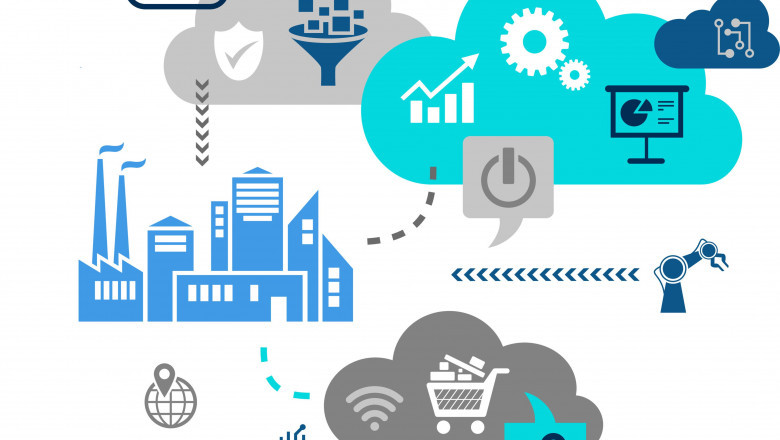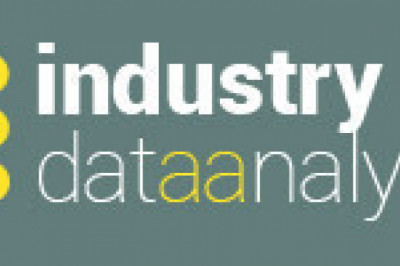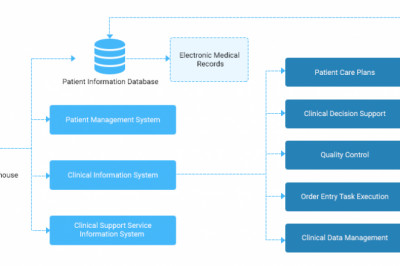views

Industrial Internet of Things (IIoT) Market size was valued at US$ 123.89 billion in 2020, and it is estimated to grow at around CAGR 22.85% during 2021-2026. Increasing penetration of smart factories, smart utilities enabling high speed data transmission and data analytics for real-time control and monitoring is analyzed to drive the Internet of Things Market. Growing demand for edge computing and related digital age technologies such as Artificial Intelligence (AI), Machine Learning (ML) for industrial automation enabling convergence of IT and OT to provide unison among all associated systems and machines have contributed to the Industrial Internet of Things (IIoT) Market growth. Increasing integration of digitalization in operational processes and industrial control system including human machine interfaces (HMIs), supervisory control and data acquisition (SCADA) systems, distributed control systems (DCSs), and programmable logic controllers (PLCs) to optimize the processes leveraging smart sensors, remote access and control are contributing towards the growth of the market.
Report Coverage
The report: “Industrial Internet of Things (IIoT) Market Forecast (2021-2026)”, by IndustryARC, covers an in-depth analysis of the following segments of the Industrial Internet of Things (IIoT) Market.
By Offering: Hardware (Access points, Sensors, Actuators, Routers, Switches, Bridges, Clients, Controllers, Gateways, others), Software (Application Specific, Middleware & APIs, Data Analytics, Data Visualization, Cloud Platforms, Security, Others), Services (System Integration, IoT Data Management, Network Management Services, Device Management Services, Cyber Security Services, Others).
By Connectivity: Wired (Ethernet/IP, Modbus, Profinet, Others), Wireless (Zigbee, Bluetooth/Bluetooth Low Energy, Wi-Fi, GPS/GNSS, WLAN, WHART, others).
By application: Industrial automation (process automation, discrete automation), asset management, environmental monitoring, connected vehicle (Vehicle to vehicle, vehicle to pedestrian, vehicle to infrastructure, others), automated guided vehicles, connected healthcare (Fitness & heart rate monitor, Blood pressure monitor, blood glucose monitor, Pulse Oxymeter, smart pill dispenser, remote diagnosis/ surgery, others), others.
By Industry Vertical: Automotive, aerospace & defense, Healthcare, Food & beverages, Power, Utilities, Logistics & transportation, Oil & Gas, Electronics & semiconductor, Chemical, Agriculture, BFSI, Telecommunications, Others.
By Geography: North America(U.S., Canada and Mexico); Europe(U.K., Germany, Italy, France, Spain, Russia,Rest of Europe); APAC (China, Japan, South Korea, India, Australia,Rest of APAC); South America(Brazil, Argentina, Rest of Americas); RoW (Middle East & Africa).
Key Takeaways
- Utility sector is estimated to account for the largest market share of 18% by 2026 due to the increasing convergence of digitalization with utility sector.
- North America is estimated to dominate the market during 2021-2026 owing to early penetration of internet, high investments towards up-gradation of advanced technologies.
- Increasing Penetration of smart manufacturing factories and increasing investments towards adoption of asset tracking sensors in logistics are analyzed to stimulate the market during forecast period 2021-2026.
- Data Security issues is one of the challenges impeding the Industrial Internet of Things (IIoT) Market growth.
Global Industrial Internet of Things (IIoT) Market Value (US$B), 2020-2026
Industrial Internet of Things (IIoT) Market Segment Analysis - By Application
By application, Industrial Internet of Things (IIoT) Market has been segmented into Industrial automation, asset management, environmental monitoring, connected vehicle automated guided vehicles, connected healthcare and others. Industrial automation dominated the market in 2020 acquiring a share of 27% and is estimated to hold the major Industrial Internet of Things (IIoT) Market share of 29% by 2026 growing at a CAGR 20.45% during 2021-2026 owing to increasing deployments of Industrial Internet of Things (IIoT) network bridging the gap between connected consumers and connected infrastructure. For instance, in June 2020, Fibocom launched Wi-Fi 6 module to enhance optimization of IoT wireless solutions with 5G. Smart utility is analyzed to be the fastest growing market with a CAGR 23.78% during 2021-2026 owing to rapid growth in smart meter manufacturing. Increasing adoption of Industrial Internet of Things (IIoT) for large-scale smart utility, smart city initiatives has simplified deployment of smart meters and street lights by offering actionable insights to manage and control efficiently. For instance, In January 2021, Semtech Corporation announced that Alpha Omega, an IoT utility metering solution provider has incorporated LoRAWAN protocol into smart meters. Such technological advancements are anticipated to stimulate the market during 2021-2026.
Industrial Internet of Things (IIoT) Market Segment Analysis - By Industry Vertical
By industry vertical, Industrial Internet of Things (IIoT) Market has been segmented into Automotive, aerospace & defense, Healthcare, Food & beverages, Power, Utilities, Logistics & transportation, Oil & Gas, electronics & semiconductor, Chemical, Agriculture, BFSI, Telecommunications and Others. Utility sector dominated the market in 2020 acquiring a share of 17% and is estimated to hold the major share by 2026 with a CAGR 21.34% during the forecast period 2021-2026 owing to the increasing convergence of utility sector with digitalization to deliver an intelligent digital grid management system. Rising adoption of Industrial Internet of Things (IIoT) for smart utility initiatives such as advanced metering infrastructure and distribution automation has significantly triggered the market growth. Deployment of Industrial Internet of Things (IIoT) in utility sector accelerates energy saving enhancing safety and reducing maintenance costs and such benefits are set to drive the market. The growing demand for digital twins in renewable energy sector to optimize the operational performance is also propelling the Internet of Things Market growth. For instance, in April 2021, Tata Power Delhi Distribution launched narrowband IoT technology based smart meters to offer real-time two way communication with optimized energy consumption based on low power wide area network technology and such developments are anticipated to boost the market. Logistics and Warehousing sector is analyzed to be the fastest growing market with a CAGR 25.67% during 2021-2026 owing to increasing penetration of intelligent warehousing and rising adoption of cobots (collaborative robots) in the sector. Massive penetration of asset tracking tags optimizing asset management is also augmenting the IoT Market.
Industrial Internet of Things (IIoT) Market Segment Analysis - By Geography
By Geography, Industrial Internet of Things (IIoT) Market has been segmented into North America, Europe, APAC, South America and RoW. North America dominated the Industrial Internet of Things (IIoT) market in 2020 acquiring a share of 31% and is estimated to hold the major share with a CAGR 19.56% during 2021-2026 owing to early penetration of internet, presence of higher number of smart cities and high investments towards up-gradation towards latest technology in this region. In March 2021, Alps Alpine, a US based leading manufacturer of electronic components announced its partnership with Skyhook, a location technology provider to receive accurate and precise location positioning from their IoT device and services and such partnerships are analyzed to boost the Industrial Internet of Things (IIoT) Market in this region. APAC is estimated to be the fastest growing market with a CAGR 24.67% during the forecast period 2021-2026 owing to rapid urbanization and shift towards digitalization. Indian Government has launched “Digital India” and “Make in India” program to establish multiple industries and setup a robust digital infrastructure across the country and such government initiatives are anticipated to drive the IoT Technology market in this region.
Industrial Internet of Things (IIoT) Market Drivers
Increasing penetration of Industry 4.0 is augmenting the growth of the market
Increasing adoption of industrial IoTs for bridging IT and OT to optimize real time applications across various industry verticals is driving the Internet of Things Market. Massive and quick adoption of connected factories enabling interoperable, ubiquitous communication among smart connected devices to monitor and control real-time data for machine-to-machine (M2M) communications optimizing production yield, efficiency and quality have contributed to the Industrial Internet of Things (IIoT) Market growth. Increasing investments towards digital transformations in business organizations to generate new business outcomes utilizing artificial intelligence, machine learning platform is steering the Industrial Internet of Things (IIoT) Market. For instance, In May 2019, Cisco partnered with Linus Tech Tips and developed some new Meraki WiFi6 compatible access points and such new developments are augmenting the Internet of Things Market.
Increasing adoption of asset tracking sensors in logistics is driving the market
Rising adoption of asset tracking sensors to ensure complete integrity and quality during transportation is bolstering the demand for industrial internet of things (IIoT) market in supply chain. The growth in adoption of SCADA, hand-held scanners, bar codes and RFID tags and other data monitoring and data acquisition systems in freight operation, warehousing and last mile delivery to get real-time visibility on movement of goods is augmenting the market. Containers and packages being transported from one place to another can be tracked in real-time and hence real-time alerts can be sent for them if any unusual activity is noticed. Industrial Internet of Things (IIoTs) has helped to reduce pilferage i.e. sensor identifies and alerts stakeholders of fuel theft and unusual usage patterns. Delivery, scheduling and placement are being automated using Industrial IoT in transportation and logistics. For instance, Tech Mahindra and Honeywell collaborated to build “factories for the future” leveraging industrial internet of things (IIoT) to scale-up autonomous factories faster. Such collaborations are set to drive the market between 2021 and 2026.
Industrial Internet of Things (IIoT) Market Challenges
Data Security issues is hampering the growth of the market
According to FBI report, financial losses caused by internet crime accumulated a total of US$ 4.2 Billion in US and the most common cyber-crimes were phishing, non-payment/non-delivery scams and extortion, with 28,500 complaints associated with COVID-19 fraud and thus adoption of robust security infrastructure has been inevitable. Enterprises that adopt Industrial Internet of Things (IIoT) face security and privacy issues. Enterprises hold sensitive and confidential data, which needs to be protected to avoid data breaches and cyber-attacks. Alarming growth in number of cyber-attacks, data leakage, false data injection in various industry verticals is hampering the adoption. However, with significant investments on cyber security is set to offset this challenge and promote healthy growth during the later stages of the forecast period 2021-2026.
Industrial Internet of Things (IIoT) Market Landscape
Product launches, Acquisitions, Collaboration, and R&D activities are key strategies adopted by players in the Industrial Internet of Things (IIoT) market. In 2020, the market of Industrial Internet of Things (IIoT) industry outlook has been fragmented by several companies. Industrial Internet of Things (IIoT) top 10 companies include:
- Cisco systems Inc.
- Hewlett Packard Enterprises
- General Electric Company
- Siemens AG
- Semtech Corporation
- Intel Corporation
- Texas Instruments
- IBM Corporation
- Microsoft Corporation
- Amazon Web Services
Acquisitions/Product Launches
- In February 2021, Siemens collaborated with IBM to expand its industrial IoT, edge computing platform. Through the joint initiative, Siemens Digital Industries Software will apply IBM's open hybrid cloud approach, built on Red Hat OpenShift, to extend the deployment flexibility of MindSphere®, the industrial IoT as a service solution from Siemens. This will enable customers to run MindSphere on-premise, unlocking speed and agility in factory and plant operations, as well as through the cloud for seamless product support, updates and enterprise connectivity.
- In August 2020, Semtech expanded it’s collaboration with Helium to provide LoRa technology based IoT devices with wireless wide area network infrastructure.Network grows to more than 1,000 cities across North America and Europe, offering connectivity for up to hundreds of millions of LoRa based devices
Relevant Report Titles:
IoT Communications Technology Market
Report Code: ESR 0205
Report Code: ITR 37031
For more Information and Communications Technology Market reports, please click here












